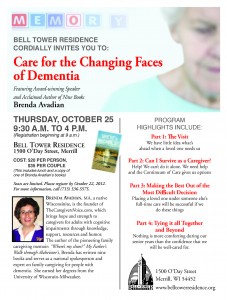Care for the Changing Faces of Dementia takes a look at how caregivers can navigate the caregiving continuum.
Part 1: The Visit
We have little idea what’s ahead when a loved one needs us.
When I visited my father on that hot August day in Milwaukee, little did I know that the impossible never-will-happen option was the one my husband and I would choose. During the two weeks of my visit, I would grow to learn more about my father and to hate him for his indecision. Whatever you do, don’t decide to become a caregiver while drinking!
Part 2: Can I Survive as a caregiver?
HELP! We can’t do it alone. We need help and the Continuum of Care gives us options.
Only one hour after we my father moved from his Wisconsin home of 45 years and into our home in California, we realized we were in waaay over our heads! With no caregiving experience (the only children we had were cats); we honored our commitment to care for him.
What would we do with him all day?
He was polite and flattering. He could be a Wal-Mart greeter!
Seriously, what other options do we have?
We used the continuum of care, which among others, included:
- in-home care by family, friends, or professionals,
- adult day care,
- support group,
- geriatric assessment, and
- skilled nursing care.
Part 3: Making the Best Out of the Most Difficult Decision
Placing a loved one under someone else’s full-time care is one of the most difficult decisions we’ll make as a caregiver.
To ensure the transition proceeds smoothly and the placement is successful, there are more than a handful of things we need to do. Three of them include the following.
- Be involved in our loved one’s care.
Visit regularly and talk with the staff and with members of the leadership team. - Get to know the other residents and their families.
Befriend other residents’ family members and advocate for one another. When you’re not there, other families can be your eyes and ears. - Have FUN.
We had birthday parties, potlucks, pizza, popcorn, and soda days.
Part 4 Topic: Tying it all together and Beyond
Nothing is more comforting during our sunset years than the confidence that we will be well-cared for.
When our loved ones’ lives take that final turn and we caregivers are asking about hospice, we need to feel we did the best we could with the resources available. At this stage, the memories we’ve made will soon comfort us.
Brenda Avadian, MA
The Caregiver’s Voice
![]()
If you’re in north central Wisconsin, October 25th, plan to attend the (click on) Bell Tower Care for the Changing Faces of Dementia conference.
Lunch is included.
Each attendee will receive a copy of one of three books available at this event.










The excitement is building at Bell Tower Residence in Merrill, Wisconsin for “Care for the Changing Faces of Dementia” seminar with Brenda Avadian presenting. Bell Tower, a sponsored ministry of the Holy Cross Sisters, has provided assisted living options for the frail elderly for more than 22 years. It is our pleasure to host this type of educational opportunity to the community.